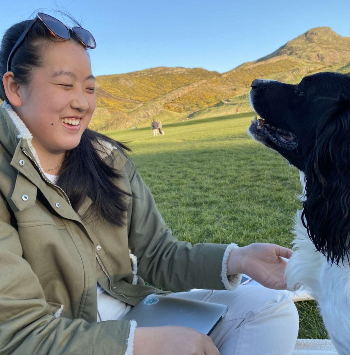
Hello! We are Callum, Ellie and Nancy. We remember how nervous we felt before starting university, so we wanted to share some insights from our experience to help you settle in. There are lots of acronyms but don’t worry, you’ll soon get your head around them!
First we wanted to tell you a bit about the various types of teaching you will get in your first year:
Lectures
These will make up roughly half of your learning time each week, so finding the best way for you to engage with them will be an important task throughout your first year. My biggest tip is to experiment with how you watch them and how you take notes. Try watching with captions/no captions, watch them in the morning/watch them after dinner, watch them at 1.5x speed (this is personal preference, but the Video Speed Controller chrome extension changed my life). Try watching a lecture without pausing when taking notes, try waiting till after the lecture ends before making your notes. Lots of things won’t work for you but with experimentation you’ll hopefully find things that help you engage better with the material.
Problem Based Learning (PBL)
This is where you’ll explore a variety of medical topics through discussion and independent research. In the first session, you’ll be given a prompt about a topic to discuss with your group (e.g. a report about a sports injury or a patient’s experience of a chronic illness). As part of your discussion, you will create questions to research between sessions to expand on the areas of the prompt where you would like to learn more. In the second session you will share your individual research and discuss your new findings.
Social and Ethical Aspects of Medicine (SEAM)
This covers the experiences of illness and healthcare in our society, as well as the ethical decisions faced by doctors and the healthcare system as a whole. Taught through lectures and interactive sessions, SEAM will cover (among other things) how social determinants (gender, race, economic status etc.) affect our experiences of illness and access to healthcare, as well the ethical debates surrounding topics like abortion and assisted suicide. These topics will be introduced in lectures and then once a week you will have an interactive discussion about how these topics affect doctors and the wider healthcare system, as well as the experience of patients in our society.
Research and Evidence Based Medicine (REBM)
This covers the research processes surrounding drugs and other medical procedures. REBM will cover many aspects of the entire research process, including the various different designs of research study, how doctors use their knowledge to decipher if studies are credible and how patients use their lived experience to interpret medical knowledge from a variety of sources. These topics will be introduced in lectures and then once a week you will have an interactive session about how these topics affect the choices made by doctors during their medical practice.
Knowledge to Clinical Practice – (KCP)
This covers how the knowledge you gain applies to the day-to-day practice of doctors. By working through preparation material followed by an interactive lecture, KCP will cover a wide variety of specialties. You will cover the common illnesses a doctor will see in their respective field, and how knowledge of biology and anatomy help these doctors to differentiate and treat the variety of illnesses they will deal with. These topics will be introduced through preparation material, commonly featuring information about a single or close set of illnesses, and often some patient interviews describing their experiences of the illness. Then once a week there will be an interactive lecture which further consolidates your learning.
Student Selected Component (SSC)
This section lets students research a focus of interest. You can choose from a wide variety of topics and then work together in a small group to produce a report and poster on your chosen topic. The variety of topics allows students to organise themselves in their group to approach their focus in different ways, choosing who will complete which jobs, and setting their own deadlines. Don’t worry if this section of the course sounds vague or confusing, as it doesn’t happen until semester 2. You will be given more info about the specific topics you can choose from and the piece of work you will need to produce at the end of your research.
Check out our other blog post for general tips about studying medicine at Edinburgh.



